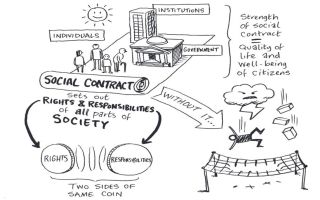A new Social Contract

As we face into the most difficult and challenging times most of us have ever known, it is important to acknowledge that despite well documented problems and challenges, Ireland is in the privileged position of having public services and social infrastructure to rely on at a time of crisis. This is due to the social contract that underpins our social infrastructure. The social contract as a concept has evolved to encompass a situation whereby citizens contribute to the common good – whether economically, socially or culturally – on the assumption that the State will provide a minimum standard of living, essential social services and infrastructure, and the protection of their basic rights.
- As part of this social contract arrangement in a modern democratic society, citizens may expect: access to meaningful work, as well as protection from poverty at times where paid employment is not accessible;
- a minimum floor of income and services in times of old age, disability or infirmity;
- an education system that is relevant, accessible and high in quality;
- a guarantee that their needs will be met at times of ill-health;
- the regulation and protection of the environment for the good of all citizens; and ensured participation in civic life and in the decisions that affect them.
In return, citizens have a responsibility to contribute to society in different ways at different points in the lifecycle.
This may be through being employed; through paying taxes; through engaging in caring and voluntary work; or making other contributions to the economic, social, cultural or environmental well-being of society.
A key part of the social contract is solidarity between generations. At different points in the lifecycle, all of us will be either net beneficiaries from, or net contributors to, society. This differs, depending on whether we are children, adults of working age, or pensioners. It depends on whether we are in full-time education, engaged in caring work, in paid employment, or volunteering in the community. But, at all times, we are contributing to and benefiting from society in different ways.
The current crisis and its impact on the economy and society mean that in the long-term we must reconceptualise the interaction of employment and work, taxation, and welfare and give serious consideration to policies such as a universal basic income.
There are major questions to be addressed about how we can simultaneously deliver a vibrant economy, decent services and infrastructure, just taxation, good governance and sustainability.
How do we sustainably deliver fiscal and financial stability, revenue for services, access to employment, pensions, social supports, education, housing, healthcare, public transport, a healthy environment, participation in civic life in the future?
How do we reconfigure the social contract to genuinely engage people? How do we develop a social contract that actively encourages both participation and collective responsibility?
Over the coming weeks Social Justice Ireland will explore what a new social contract could look like, one that would secure fairness across generations and a sustainable future.